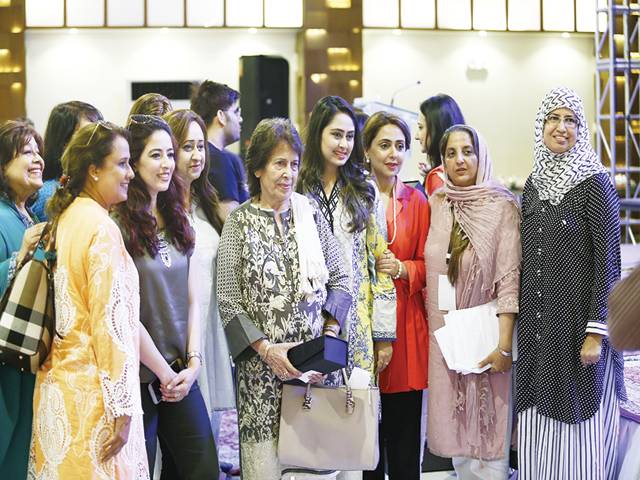KARACHI - A three-day festival focusing on women of Pakistan, with a determination to commemorate the achievements of women and acknowledge the special status they deserved in society was held yesterday at a local marquee in Karachi.
Divided into two sets of panel discussions, every day, the event was hosted by Shenaz Ramzi. Concurrent to the seminars people from all walks of life attended the art exhibition and appreciated the artwork of the artists.
The first day of the festival started with the powerhouse of HUM Network Sultana Siddiqui, who delivered an inspiring speech on the women empowerment in Pakistan.
Next session was ‘Breaking the ceiling of Women empowerment in Pakistan’. Uzma Al Karim moderated the session and the panelists included renowned names such as RabyaJaveru, MehtabRashdi, Justice MajidaRizvi and Faiz Ali Meerza.
When asked why females are not appointed for the seat of Judge in Pakistan Justice Majida Rizvi said, “When I enrolled in Law college I was one of only six girls. My father never had problem with me to study Law but after graduation when I decided to practice he was a bit hesitant. It took six months to persuade my family and after a long discussion they finally agreed.”
“I worked hard to establish the rights of women in Pakistan. I used to writing articles on women rights to highlight their basic issues in front of the public. Pakistan is only the country in South Asia that avoids electing women judges in Supreme Court. There are so many senior lawyers who deserves for this post but because of the gender dissemination they are often neglected. When Benazir Bhutto came to power it was her vision that women judges should be appointed for higher judiciary and at that time my hard work paid off and I was appointed as the first female judge,” She said.
About the laws made to provide justice to women Mehtab Rashdi said “Women and men should be given proper rights not only in the sector of health and education but also in the economic sectors. Legislation had great importance for protecting the rights for women, but at the time implementation of laws is also necessary.”
“We recently did a survey and found more than 1.1 million children are under the burden of child labour and mostly are unable to eat food properly. It was the Sindh government that made a law that no one could the take advantage of from these innocent children.”
“Greedy people bring children under 14 from mostly rural areas for their advantages and family economic compulsion we are making efforts on this serious issue so that no one could exploit them and they should be given proper care centers,” she said.
About women rights in Pakistan film industry producer Fiza Ali said “whatever medium you are working on there is always a need of improvement in it. I think moral education of a child is not the sole responsibility of an institution. Family has an equally important role to play. The best thing about the medium of film is it reaches to mass audience. It feels great to be talked as woman filmmaker. Its apart of who I’m, it effects me daily. Cinema is all about escapism. Through film we convey our message to the audience that Pakistani women do not lag behind anyone and work in every field equal to men,” She said.
The seminar ended with an award ceremony in which six inspiring women’s were recognised for their efforts in promoting UN SDG goals.
The first awarded was presented to Sultana Siddiqui for gender equality, Farzana Ahmad for the food project trust in the category of zero hunger, Shahnaz Kapadia for Mera Maan for no poverty, Mantaha Maqsood for Good health and well-being, Majida Rizvi for peace and Justice strong institution and Sabina Khatri of Kiran School for quality education.
After a short break, a seminar on Women health was took off. The seminar was divided into two panel discussions. Session one was on ‘Skin problems and Invasive treatments’. Renowned panelists such as Naqiba Munshi, Dr Seema Hirji and Dr Uzman Tiwana gave a comprehensive insight on the subject. Azeemah Nakhoda moderated the discussion.
FAIZAN JAVED






